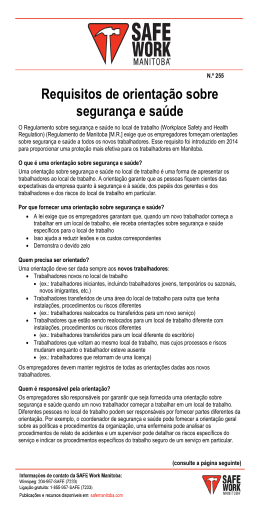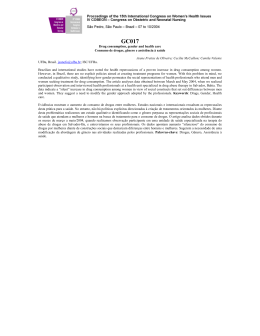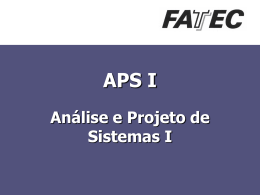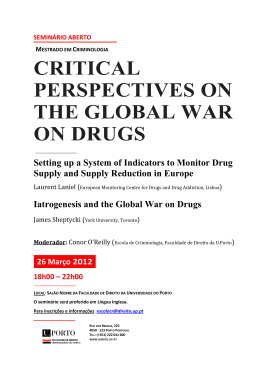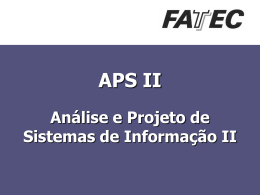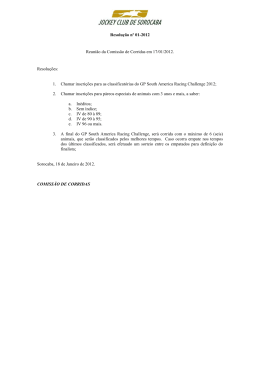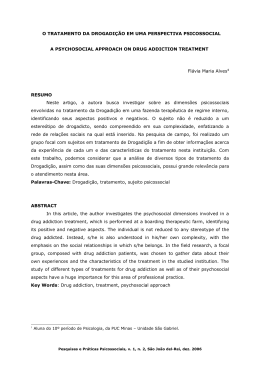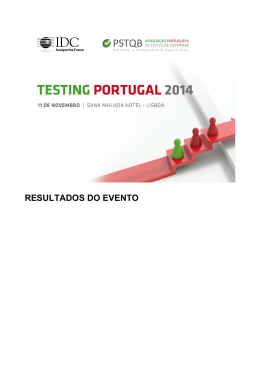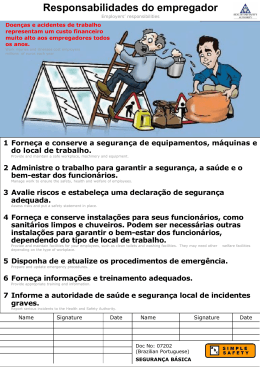Workplace drug testing: a challenge in Portugal Jorge Barroso Dias President of the Portuguese Society of Occupational Health 28th May 2015 European Workplace Drug Testing Society 28th-29th Lisbon Conference Sana Malhoa Hotel Previous information: - President of the Board of the Portuguese Society of Occupational Health (SPMT) Founder and coordinator of the SPMT Task Force “Alcohol and addictive behaviors” Member of the Executive Commission of the Alcohol and Health National Forum Member of the SICAD Alcohol in the Workplace Intervention Task Force Researcher in Alcohol Screening and Brief Interventions (ASBI) BISTAIRS PROJECT- Portuguese Team: expert for Workplace and Social Services Workplace drug testing: a challenge in Portugal! Previous information: - Occupational Health Physician since 1996 - Sugar Refinery: Occupational Health Physician - North-American Headquarters demands: - Drug testing mandatory for alcohol dependents! - … only risky users! - Occupational Health Coordinator in the Lisbon City Hall OH services - Longtime experience in Alcohol/drug testing, - Psychologists and other OH professionals advocate drug testing - Drug Testing Program is temporarily suspended!... Workplace drug testing is a challenge in Portugal! Workplace drug testing: a challenge in Portugal! Introduction - Occupational Health Services mission: - Protect the workers’ health and safety. - Promote healthy workplaces. - Promote healthy organizations. - The best way to advocate psychoactive drugs testing is to use it properly: - at the right moment… - in the right context!... Workplace drug testing: a challenge in Portugal! Introduction - Workplace drug testing is: - essentially an intervention rather than strictly a diagnosis. - For employers: a way to control the dependent drinkers/users for safety and image reasons… - But forgetting the risky drinkers (socially accepted!)... - And forgetting white-colored workers!... - For employees: “the physician is a policeman!...” - For the Physician: - “I don’t need tests to know who is dependent or a heavy drinker”; - “I need drug testing to force patients to treatment!” Workplace drug testing: a challenge in Portugal! Workplace drug testing 1 - Workplace drug testing is presently a challenge in Portugal. 2 - Portugal: - Traditionally a producer of alcoholic beverages. - with a social culture of alcohol consumption. - maintains a prevalence of risky drinking and Alcohol-Related Problems (ARP) at worrisome levels and with a heavy social and public health burden. Workplace drug testing: a challenge in Portugal! Workplace drug testing Workplace in Portugal: - mirrors this risky drinking social culture. - presents challenges to employers, workers and Occupational Health and Safety services. - Recent evolution makes alcohol screening tests an exclusive area of action of: - the Occupational Health services, - Forensic Medicine and - Road Safety services (for citizens and workers who drive). Workplace drug testing: a challenge in Portugal! Workplace drug testing The challenge: Due to the present legal framework which defines: - the Alcohol-Related Problems (ARP) as health problems of the Portuguese (citizens and workers). - the results of alcohol (and other psychoactive substances) screening tests are considered clinical data subject to medical confidentiality. - All Drug Testing Programs need approval from the Data Protection National Commission. Workplace drug testing: a challenge in Portugal! Workplace drug testing There is still a wide debate in the search for framed solutions, which can be both comprehensive and pragmatic concerning Alcohol and other psychoactive substances Prevention Programs in the workplace and with drug screening tests. – This discussion has been opposing: • • • • workers’representatives, employers’representatives, Occupational Health services and multiple institutions with responsibilities on this matter. Workplace drug testing: a challenge in Portugal! International ILO practical recommendations on screening tests: – They raise fundamental problems regarding moral, ethical and legal issues; decision concerning its justice and pertinence. – They should be done in accordance with national legislation and practices. Directing principles for tests destined to screen the use of alcohol and drugs in the workplace adopted by the ILO Interregional Tripartite Experts Meeting (1014 May 1993, Oslo) Workplace drug testing: a challenge in Portugal! International “Cadre de Reference / Reference Framework” Michel Massacret, Group Pompidou • Reference Framework for the prevention of alcohol and drug use in the workplace adopted on 15th May 2012 following the international conference «Alcool, drogues et prévention en milieu professionnel: quels enjeux, quels défis pour les gouvernements, l’entreprise et les personnels?» • Result of the ad hoc expert group work • Final Declaration adopted on May 2012 → Reference Framework www.coe.int/T/DG3/Pompidou/Source/Activities/Workdrug/P-PGWork_2012_3rev1_Final_Declaration_fr.pdf www.coe.int/T/DG3/Pompidou/Activities/work_fr.asp Workplace drug testing: a challenge in Portugal! International “Cadre de Reference / Reference Framework” Michel Massacret, Grupo Pompidou Some key principles –Three functions: prevention, safety and monitoring/follow-up.[...] –Framework supported by the principles of responsibility, transparency and respect for individual and collective freedom. [...] –Participation of all the actors and involvement of top management. –It aims, since the beginning of the prevention, at the definition of the roles and responsibilities of the different actors. [...] Workplace drug testing: a challenge in Portugal! International “Cadre de Reference / Reference Framework” Michel Massacret, Grupo Pompidou Added value of the Framework Addictive behaviours cause harm to people and the company’s functioning. Therefore, the need for a policy which is conciliatory of the Occupational Health and Safety objectives, limiting the consequences on employability. Workplace drug testing: a challenge in Portugal! Portuguese Legislation • International Legislation – Convention nº 108 from the European Council – European Directive 95/46/CE – Charter of Fundamental Rights of the European Community (Lisbon Treaty) • National Legislation – Portuguese Constitution – Personal Data Protection legislation (Law nº 67/98) – Labour legislation / Labour General Law for Public Functions – Occupational Health and Safety Regulation (Law nº 102/2009) – CNPD Deliberation nº 890/2010 Workplace drug testing: a challenge in Portugal! Portuguese Framework: SICAD - General Directorate for Intervention on Addictive Behaviours and Dependencies 2011: “Occupational Health and Safety and the Prevention of psychoactive substances use: Guidelines for Intervention in the Workplace” ACT & IDT version, 2011 SICAD version, 2014 Workplace drug testing: a challenge in Portugal! Referral Network - global flowchart Occupational Health Social Services Workplace drug testing: a challenge in Portugal! Condução rodoviária, construção civil e obras públicas • Enquadramento legislativo: – Governo Português (2005): “Decreto-Lei nº 44/2005”. Diário da República – Iª Série A. nº38, 23 de Fevereiro, pp.1554-1525. DESACTUALIZADA – Assembleia da República Portuguesa (2007): “Lei n.º 18/2007”. Diário da República – Iª Série, nº95, de 17 de Maio, pp.3357-3360. – AECOPS – Associação de Empresas de Construção Obras Públicas e Serviços, SETACCOP – Sindicato da Construção, Obras Públicas e Serviços Afins (2010): “Contrato Colectivo de Trabalho para a Indústria de Construção Civil e Obras Públicas (Revisão Global)”. Boletim de Trabalho e Emprego, nº 17, de 8 de Maio. – Assembleia da República Portuguesa (2009): “Lei n.º 7/2009”. Diário da República – Iª Série, nº30, de 12 de Fevereiro, pp.926-1029. Condução rodoviária • Lei n.º 72/2013 de 3 de setembro - 13ª alteração ao Código da Estrada Artigo 81.º - Condução sob influência de álcool ou de substâncias psicotrópicas 1 - É proibido conduzir sob influência de álcool ou de substâncias psicotrópicas. 2 - Considera -se sob influência de álcool o condutor que apresente uma taxa de álcool no sangue igual ou superior a 0,5 g/l ou que, após exame realizado nos termos previstos no presente Código e legislação complementar, seja como tal considerado em relatório médico. [...] Condução rodoviária • Lei n.º 72/2013 de 3 de setembro - 13ª alteração ao Código da Estrada Artigo 81.º - Condução sob influência de álcool ou de substâncias psicotrópicas 4 - A conversão dos valores do teor de álcool no ar expirado (TAE) em teor de álcool no sangue (TAS) é baseada no princípio de que 1 mg de álcool por litro de ar expirado é equivalente a 2,3 g de álcool por litro de sangue. 5 - Considera -se sob influência de substâncias psicotrópicas o condutor que, após exame realizado nos termos do presente Código e legislação complementar, seja como tal considerado em relatório médico ou pericial. Condução rodoviária • Lei n.º 72/2013 de 3 de setembro - 13ª alteração ao Código da Estrada Artigo 81.º - Condução sob influência de álcool ou de substâncias psicotrópicas 6 - Quem infringir o disposto no n.º 1 é sancionado com coima de: a) € 250 a € 1250, se a taxa de álcool no sangue for igual ou superior a 0,5 g/l e inferior a 0,8 g/l; b) € 500 a € 2500, se a taxa for igual ou superior a 0,8 g/l e inferior a 1,2 g/l ou, sendo impossível a quantificação daquela taxa, o condutor for considerado influenciado pelo álcool em relatório médico ou ainda se conduzir sob influência de substâncias psicotrópicas. [...] Condução rodoviária • Lei n.º 18/2007 de 17 de Maio - Regulamento de Fiscalização da Condução sob Influência do Álcool ou de Substâncias Psicotrópicas Artigo 1.º - Detecção e quantificação da taxa de álcool 1 - A presença de álcool no sangue é indiciada por meio de teste no ar expirado, efectuado em analisador qualitativo. 2 - A quantificação da taxa de álcool no sangue é feita por teste no ar expirado, efectuado em analisador quantitativo, ou por análise de sangue. 3 - A análise de sangue é efectuada quando não for possível realizar o teste em analisador quantitativo. Artigo 8.º - Substâncias psicotrópicas a avaliar [...] 1,2 [...] Condução rodoviária • Lei n.º 18/2007 de 17 de Maio - Regulamento de Fiscalização da Condução sob Influência do Álcool ou de Substâncias Psicotrópicas Artigo 11.º - Exame de rastreio 1 - O exame de rastreio é efectuado através de testes rápidos a realizar em amostras biológicas de urina, saliva, suor ou sangue e serve apenas para indiciar a presença de substâncias psicotrópicas. [...] 2,3 [...] Artigo 12.º - Exame de confirmação 1 - O exame de confirmação é realizado numa amostra de sangue, após exame de rastreio com resultado positivo. [...] 2-6 [...] Artigo 13.º - Exame médico 3 - A presença de sintomas de influência por qualquer das substâncias previstas no n.o 1 do artigo 8.o, ou qualquer outra substância psicotrópica que possa influenciar negativamente a capacidade para a condução, atestada pelo médico que realiza o exame, é equiparada para todos os efeitos legais à obtenção de resultado positivo no exame de sangue. [...] 2,3 [...] Construção civil e obras públicas • Contrato colectivo entre a AECOPS (Associação de Empresas de Construção e Obras Públicas e Serviços e outras) e o SETACCOP (Sindicato da Construção, Obras Públicas e Serviços Afins e outros) - Rectificação (Boletim do Trabalho e Emprego, n.º 17, 8/5/2010) Cláusula 78.ª - Prevenção e controlo de alcoolemia 1 - Não é permitida a realização de qualquer trabalho sob o efeito do álcool, nomeadamente a condução de máquinas, trabalhos em altura e trabalhos em valas. 2 - Considera -se estar sob o efeito do álcool o trabalhador que, submetido a exame de pesquisa de álcool no ar expirado, apresente uma taxa de alcoolemia igual ou superior a 0,5 g/l. [...] 3,4 [...] 5 - O controlo de alcoolemia será efectuado com carácter aleatório entre os trabalhadores que prestem serviço na empresa, bem como àqueles que indiciem estado de embriaguez, devendo para o efeito utilizar -se material apropriado, devidamente aferido e certificado. [...] 6,7 [...] Construção civil e obras públicas • Contrato colectivo entre a AECOPS (Associação de Empresas de Construção e Obras Públicas e Serviços e outras) e o SETACCOP (Sindicato da Construção, Obras Públicas e Serviços Afins e outros) - Rectificação (Boletim do Trabalho e Emprego, n.º 17, 8/5/2010) Cláusula 78.ª - Prevenção e controlo de alcoolemia 8 - A realização do teste de alcoolemia é obrigatória para todos os trabalhadores, presumindo-se em caso de recusa que o trabalhador apresenta uma taxa de alcoolemia igual ou superior a 0,5 g/l. 9 - O trabalhador que apresente taxa de alcoolemia igual ou superior a 0,5 g/l ficará sujeito ao poder disciplinar da empresa, sendo a sanção a aplicar graduada de acordo com a perigosidade e a reincidência do acto. 10 - Sem prejuízo do disposto no número anterior e como medida cautelar, caso seja apurada ou presumida taxa de alcoolemia igual ou superior a 0,5 g/l, o trabalhador será imediatamente impedido de prestar serviço durante o restante período de trabalho diário, com a consequente perda da remuneração referente a tal período. [...] 11-13 [...] Jurisprudência Acórdão do Tribunal Constitucional nº319/95 (1995) Constitucionalidade dos testes de pesquisa de álcool em trabalhadores (relacionada com devassa da vida privada). “[…] não se trata, com o teste de pesquisa do álcool, de devassar os hábitos da pessoa do condutor no tocante à ingestão de bebidas alcoólicas, sim e tão-só (recorda-se) de recolher prova perecível e de prevenir a violação de bens jurídicos valiosos (entre outros, a vida e a integridade física), que uma condução sob a influência do álcool pode causar – o que, há-de convir-se, tem relevo bastante para justificar, constitucionalmente, esta constrição do direito à intimidade do condutor.” Ref. Biblio.: TC (1995): “Acórdão nº319/95”. Acórdãos do Tribunal Constitucional, 31º vol., p. 501. Workplace drug testing: a challenge in Portugal! Jurisprudência Acórdão do Supremo Tribunal de Justiça nº 97S243 (24/06/1998) Direito da entidade patronal efectuar testes de alcoolémia e recusa dos trabalhadores em submeter-se a eles. “A determinação da entidade patronal de efectuar testes de alcoolémia aos seus trabalhadores não viola os artigos 24, 25 e 26 da Constituição. Essa determinação constitui uma ordem legítima. A recusa do trabalhador em se submeter ao teste viola o dever de obediência. Essa discordância, acompanhada de anterior sanção disciplinar por alcoolémia, constitui justa causa de despedimento.” Workplace drug testing: a challenge in Portugal! Jurisprudência Acórdão do Supremo Tribunal de Justiça 08S931 (18/06/2008) Despedimento com justa causa de trabalhador da CP com alcoolemia superior ao limite legal em caso de acidente ferroviário. “1. Integra justa causa de despedimento, a conduta de um maquinista da C. P. que, apesar de o operador de circulação lhe ter comunicado que o sinal da Linha III estava aberto para outro comboio e que ia fechar os caminhos e que depois os mandaria abrir para ele, iniciou a marcha e ultrapassou um sinal na posição de fechado, e que, submetido a teste de controlo de alcoolemia, na sequência desse acidente, apresentava uma percentagem de 1,00 g/l de álcool no sangue, sendo que, nos termos do ponto 5.3. do regulamento de prevenção e controlo do trabalho sob o efeito do álcool ou de substâncias estupefacientes ou psicotrópicas em vigor na empresa, considera-se sob a influência do álcool e inapto para o trabalho, o trabalhador que apresente taxa de alcoolemia igual ou superior a 0,5 g/l.” Workplace drug testing: a challenge in Portugal! Jurisprudência Acórdão do Supremo Tribunal de Justiça 08S931 (18/06/2008) Despedimento com justa causa de trabalhador da CP com alcoolemia superior ao limite legal em caso de acidente ferroviário. “2. O comportamento enunciado configura uma falta grave e culposa de observância de normas de condução e segurança no trabalho, susceptível de gerar acrescidos riscos de acidentes de trabalho e perigo para a segurança da circulação dos transportes ferroviários de passageiros e mercadorias, e implica a impossibilidade prática de manter a relação laboral, já que se verifica uma situação de absoluta quebra de confiança entre a entidade empregadora e o trabalhador.” Workplace drug testing: a challenge in Portugal! Jurisprudência Acórdão do Supremo Tribunal Administrativo 076/10 (09/09/2010) Município do Porto versus Comissão Nacional de Protecção de Dados (acórdão em que a Câmara Municipal do Porto foi impedida de fazer testes de álcool ilegais). “O MUNICÍPIO DO PORTO intentou no TCA Norte acção administrativa especial contra a COMISSÃO NACIONAL DE PROTECÇÃO DE DADOS (CNPD), peticionando a anulação da deliberação da Ré, de 28.04.2008, que não autorizou o tratamento de dados pessoais relativo à realização de testes de alcoolémia nos termos do Regulamento interno submetido à sua apreciação, bem como a condenação da Ré à prática do acto devido – autorização do tratamento de dados referentes aos aludidos testes de alcoolémia, nos termos constantes do dito Regulamento interno. Por acórdão daquele Tribunal, de 09.10.2009 (fls. 157 e segs.), foi a acção julgada totalmente improcedente e, em consequência, absolvida a Ré do pedido.” Workplace drug testing: a challenge in Portugal! Jurisprudência Ruling of the Supreme Administrative Court nº 076/10 (09/09/2010) Porto Municipality versus the Data Protection National Commission (ruling in which the Porto City Hall was not allowed to do illegal alcohol screening tests) “As a matter of fact, being faced with the comprehension of a fundamental right, it will be inadequate to subject the totality of the workers to the possibility of effectuating alcohol use tests, processing the respective data, if the aim of preventing problems resulting from said alcohol use is attained through measures for certain professional categories in which the alcohol use involves greater risks for third parties and the self. We have distinct universes of workers, that deserve, as such, different attitudes from the top management.” Workplace drug testing: a challenge in Portugal! Jurisprudência Acórdão do Supremo Tribunal Administrativo 076/10 (09/09/2010) Município do Porto versus Comissão Nacional de Protecção de Dados (acórdão em que a Câmara Municipal do Porto foi impedida de fazer testes de álcool ilegais). “[…] a sujeição indiscriminada e generalizada de todos os funcionários do recorrente aos referidos testes de alcoolemia, para efeito de tratamento de dados, afrontaria igualmente – ela sim – o princípio da proporcionalidade, que impõe à Administração a prossecução do fim legal em termos adequados e proporcionais aos objectivos a realizar […]” Workplace drug testing: a challenge in Portugal! Jurisprudência DELIBERAÇÃO Nº 890 /2010 da Comissão Nacional de Protecção de Dados (15/11/2010) Aplicável aos tratamentos de dados pessoais com a finalidade de medicina preventiva e curativa no âmbito dos controlos de substâncias psicoactivas efectuados a trabalhadores. “[...] dados sensíveis, os quais assumem esta natureza, quer por se tratar de dados de saúde, por um lado, e, por outro, por se inserirem na noção de dados relativos à “vida privada”. Workplace drug testing: a challenge in Portugal! Jurisprudência DELIBERAÇÃO Nº 890 /2010 da Comissão Nacional de Protecção de Dados (15/11/2010) Aplicável aos tratamentos de dados pessoais com a finalidade de medicina preventiva e curativa no âmbito dos controlos de substâncias psicoactivas efectuados a trabalhadores. “A CNPD colaborou com o Instituto da Droga e da Toxicodependência, I.P. (IDT) no âmbito do protocolo “Prevenção de Riscos em Meio Laboral” [...]” “Como resultado final do trabalho desenvolvido no âmbito do protocolo supra identificado foi elaborado um documento intitulado “Segurança e Saúde do Trabalho e a Prevenção do Consumo de Substâncias Psicoactivas: Linhas Orientadoras para a Intervenção em Meio Laboral” [...]” Workplace drug testing: a challenge in Portugal! Jurisprudência DELIBERAÇÃO Nº 890 /2010 da Comissão Nacional de Protecção de Dados (15/11/2010) Aplicável aos tratamentos de dados pessoais com a finalidade de medicina preventiva e curativa no âmbito dos controlos de substâncias psicoactivas efectuados a trabalhadores. “[...] analisar e delimitar os princípios a observar pela CNPD na apreciação das notificações de tratamentos com esta finalidade que lhe sejam submetidos [...]” “- Disponibilizar aos responsáveis dos tratamentos os princípios de protecção de dados aplicáveis nestas situações e estabelecer as regras orientadoras para o correcto cumprimento da Lei de Protecção de Dados; - Dar a conhecer aos trabalhadores, titulares desses dados, os direitos que lhes assistem e os limites estabelecidos para estes tratamentos de dados.” Workplace drug testing: a challenge in Portugal! Jurisprudência Segurança e Saúde do Trabalho e Prevenção do Consumo de Substâncias Psicoativas: Linhas Orientadoras para a Intervenção em Meio Laboral (2014) SICAD (Serviço de Intervenção nos Comportamentos Aditivos e nas Dependências) “Os testes de álcool ou de deteção de drogas apenas serão lícitos em casos excecionais, quando estejam em causa interesses para a saúde e bem-estar do trabalhador, do empregador, ou de terceiros (Código do Trabalho – artigo 19º, nº 1). No entanto, o rastreio já não será aceitável em termos legais (de princípios de proporcionalidade, adequabilidade e razoabilidade), quando não exista uma razão objetiva para o realizar em função da segurança para outros trabalhadores, para os utentes dos serviços ou para a comunidade em geral ou quando, desse ponto de vista, os riscos sejam mínimos.” Workplace drug testing: a challenge in Portugal! Instituições particulares de solidariedade social Fundação Portuguesa para o Estudo, Prevenção e Tratamento da Toxicodependência IPSS, de utilidade pública com fins de saúde: - problemáticas de saúde mental - prevenção, tratamento e reinserção da toxicodependência e alcoolismo Fundada pela Santa Casa de Misericórdia de Cascais em 1986. Equipa técnica multi-disciplinar: - Psicologia, Psiquiatria e Serviço Social - Serviços e programas de intervenção: Prevenção, Reinserção Social, Terapia de Grupo e Individual (Terapia familiar, mediação familiar, terapia cognitivo-comportamental, Psico-drama e Animação socioterapêutica). www.toxicodependencias.org National studies Shortage of national studies and statistical data on alcohol tests www.ewdts.org/wdt-in-europe.html “Few studies have investigated this subject. Vitòria [1] in 1994, on a survey on the companies of the Lisbon district with more than 50 workers, estimated 20% doing drug testing. Pinheiro et al [2] registered in 1997, 14% of the largest Portuguese companies (with a workforce over than 1000) performing tests, the majority in an unreliable way.” Workplace drug testing: a challenge in Portugal! National studies Shortage of national studies and statistical data on alcohol tests www.ewdts.org/wdt-in-europe.html “Effective number of tests executed and its results are extremely difficult to obtain, as the majority of employers do not assume his testing programs. The most representative (and probably sole) indicators existent are those of the Portuguese Army (currently professionalised), the positive results obtained have decreased from 17% in 1986 to 5.8% in 1995 - of which 4.1% of the cases refer to cannabis and 1.4% to opiate [2]. It must be said that the Portuguese Navy is surely the greatest authority on drug abuse control and testing programs in Portugal, working since a decade ago very closed to the US Navy, where his professionals (medical doctors, toxicologists, and many others) were trained.” Workplace drug testing: a challenge in Portugal! National studies Shortage of national studies and statistical data on alcohol tests www.ewdts.org/wdt-in-europe.html “Vitoria, P.D. (1994). Consumo de alcool e drogas ilegais em empresas do distrito de Lisboa. Fundacao Portuguesa para o Estudo, Prevencao e Tratamento da Toxicodependencia, Cascais. Pinheiro, J.; Pinheiro R.; Marques, E.P.; Vieira, D.N. (1997). O consumo de substãncias nas maiores empresas portuguesas. 4° Forum de Medicina do Trabalho, Lisboa” Workplace drug testing: a challenge in Portugal! Question always repeated: WHY? “People turn to alcohol, drugs and tobacco to numb the pain of harsh economic and social conditions.” • Michael Marmot e Richard Wilkinson. in “Social determinants of health: the solid facts” – 2nd edition, (WHO, 2003) Workplace drug testing: a challenge in Portugal! The problems regarding the use of psychoactive substances are many times related with: Workplace Causes • Bad physical or psychological work conditions; • Job insecurity; • Low remuneration; • Workers’ frustration or loss of motivation; • Inadequate technical reconversions; Workplace drug testing: a challenge in Portugal! The problems regarding the use of psychoactive substances are many times related with: Workplace Causes • Badly defined Internal Regulations and functions; • Aggressive competition; • Lack of social incentives; • Peer pressure; • Work shifts; Workplace drug testing: a challenge in Portugal! Other causes: • Unhealthy lifestyles; • Disruptive facts of the life cycle: – Adolescence – Marriage / divorce / births – Retirement – Lay-off – Etc. Workplace drug testing: a challenge in Portugal! Risk levels and intervention Workplace drug testing: a challenge in Portugal! Alcohol: continuum • Continuum • Alcohol use should be faced as a continuum, • in which the person can freely go from one level to the other in any direction. Raistrik D, Heather N, Godfrey C. Review of the effectiveness of treatment for alcohol problems: The National Treatment Agency for Substance Misuse; 2006. Workplace drug testing: a challenge in Portugal! Alcohol: use continuum >>>>>> Continuum >>>>>>> Workplace drug testing: a challenge in Portugal! Occupational Health: Prevention and intervention What we see IN THE ACTIVE POPULATION 16 years old Occupational Health What we do Workplace drug testing: a challenge in Portugal! Occupational Health: Prevention and intervention What we should do IN THE ACTIVE POPULATION 16 years old Occupational Health Workplace drug testing: a challenge in Portugal! Culture of alcohol use in society... ... and in the companies Companies ask for alcohol screening tests NA POPULAÇÃO ACTIVA 16 anos But, they maintain a culture of alcohol use!.. Excluding the management Workplace drug testing: a challenge in Portugal! Low risk / harmful alcohol use: we need consensus! • Low risk alcohol use: – 1 or 2 drinks divided by the main meals (considering that the drinks should not be distilled) – and at least 2 days of abstinence during the week. • Harmful alcohol use: – Any alcohol use by vulnerable groups (pregnant women, people under 18 years old, people with health issues where alcohol use is advised against) – and all alcohol use above the low risk use. Barroso, Teresa (2014) Workplace drug testing: a challenge in Portugal! Prevention: the agents • Who is responsible for Prevention? We all are! Citizens, Employers, Workers! ... Not just the health professionals! Workplace drug testing: a challenge in Portugal! Prevention of Psychoactive Substances Use • Alcohol and other addictive behaviours in Micro, Small and Medium Companies Leaflet elaborated by the Intervention in the Workplace Restrict Group, available at: • www.dgs.pt/saudeocupacional/documentosdiversos/panfleto-prevencao-do-consumode-substancias-psicoativas-pdf.aspx • www.sicad.pt/BK/Intervencao/meio_labor al/Documents/desdobravel.pdf Workplace drug testing: a challenge in Portugal! Prevention of Psychoactive Substances Use Workplace drug testing: a challenge in Portugal! Prevention of Psychoactive Substances Use Workplace drug testing: a challenge in Portugal! Prevention of Psychoactive Substances Use • Stages for the implementation and development of the approach to psychoactive substances use in the workplace: 1. 2. 3. 4. 5. Set the problem as a company concern Global Awareness of the Company Identify Needs Occupational Health Services Referral Workplace drug testing: a challenge in Portugal! Prevention of Psychoactive Substances Use 4. Occupational Health Services • • • Should provide support to the company since the initial stage. In the medical exams (periodic or occasional asked by the company or worker) the Occupational Health physician determines the Fitness for Work, besides providing personalized support to workers with risks associated with psychoactive substances use: supplementary diagnostic tests, treatments, recommendations, health strategies, rehabilitation, etc. For specific treatments he refers the worker to the General Practitioner or the Referral Network. Workplace drug testing: a challenge in Portugal! Conclusion: Questions - If the Occupational Health mission is: Protect the workers’ health and safety, promote healthy workplaces and promote healthy organizations… - If the best way to advocate psychoactive drugs testing is to use it properly… - Are we using the drug testing at the right moment? - … in the right context? - What are we doing to control the social culture of alcohol and drugs consumption? - What are the organizations doing to help us in our mission? Workplace drug testing: a challenge in Portugal! References: • Ribeiro C. [Family medicine approach to alcohol consumption: detection and brief interventions in primary health care]. Acta Med Port 2011;24 Suppl 2:355-68. • World Health Organization. Global status report on alcohol and health2014. World Health Organization, 2014. • Anderson P, Gual A, Colom J. Alcohol and Primary Health Care: Clinical Guidelines on Identification and Brief Interventions.: Department of Health of the Government of Catalonia: Barcelona.; 2005. • A. O`Donnell et al. 2014. The Impact of Brief Alcohol Interventions in Primary Healthcare: A Systematic Review of Reviews. Alcohol & Alcoholism • B. Schulte et al. 2014. Alcohol screening and brief intervention in workplace settings and social services: A comparison of literature. Frontiers in Psychiatry • Kääriäinen J, Sillanaukee P, Poutanen P, Seppä, K. Opinions on alcoholrelated issues among professionals in primary, occupational, and specialized health care. Alcohol and alcoholism. 2001; 36(2):141-146. Workplace drug testing: a challenge in Portugal! OBRIGADO! Thank you! Jorge Barroso Dias [email protected] [email protected] Sociedade Portuguesa de Medicina do Trabalho Workplace drug testing: a challenge in Portugal!
Baixar
